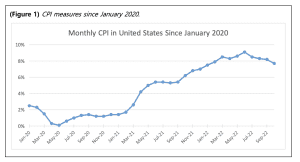
The office’s latest report found buying power at home and within government has dropped 13% since 2020.
The Office of the State Auditor for Mississippi, overseen by Auditor Shad White, conducted an inflation report for the state’s agencies.
In the report, the Auditor found that taxpayers are paying more for nearly everything government agencies purchase in Mississippi. This includes fuel and electricity as well as food and asphalt.
The purpose of the report is to alert policymakers to the cost of inflation on government spending and to help public officials more effectively plan future budgets by anticipating these costs.

“Families are hurting from inflation every time they visit the gas station or grocery store,” said Auditor White. “Taxpayers need to know that the money they’ve given to the government won’t go as far, too. I hope this report will help budget writers anticipate where their costs will be higher in coming months.”
The Consumer Price Index (CPI) shows the price change of household goods by comparing today’s price of a certain item against its price at the same time last year. In the chart above, the CPI shows inflation as measured since January 2020.
The report indicated that when inflation prices are higher, less public good can be done by state agencies.
The Auditor notes some potential cuts due to the inflation that could occur include:
- Increased fuel prices have cost the Mississippi Department of Public Safety up to $750,000 in 2022. Law enforcement agencies may be forced to cut patrols in the future if gas prices remain high.
- As roadbuilding supplies like asphalt and drainage pipes become more expensive, the Mississippi Department of Transportation may not be able to complete all its scheduled projects at their original budgeted costs.
- With electricity prices spiking, the cost for the Mississippi Department of Corrections to house inmates has increased dramatically.
- Taxpayers will foot the bill for meal programs in schools and prisons as food prices rise.
This year has brought record high inflation for taxpayers at home as well. Buying power has dropped 13% since January of 2020 which means taxpayers will continue to pay more for less both at home and within government offices.
“As Mississippi spends billions of federal dollars on infrastructure and technology investments into communities and schools, inflated prices will likely limit the scope of what these projects can accomplish. 12 Policymakers should consider this report and the expected price of future inflation when writing budgets and planning projects for the foreseeable future,” the report concluded.
You can view the full report below:
Inflation Report by yallpolitics on Scribd












